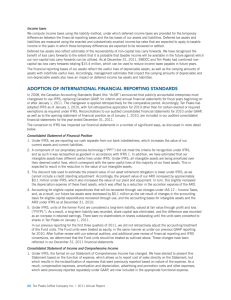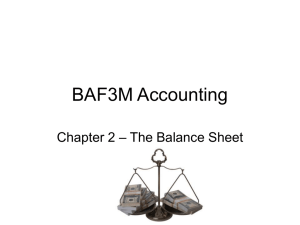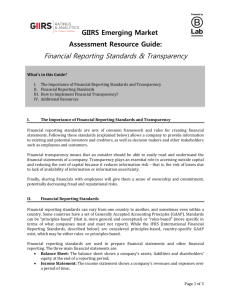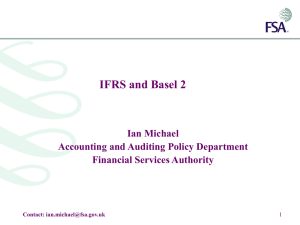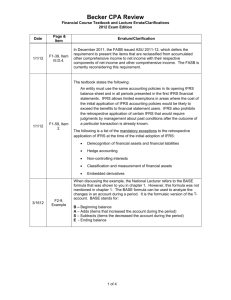International Financial Reporting Standards (“IFRS”)
advertisement
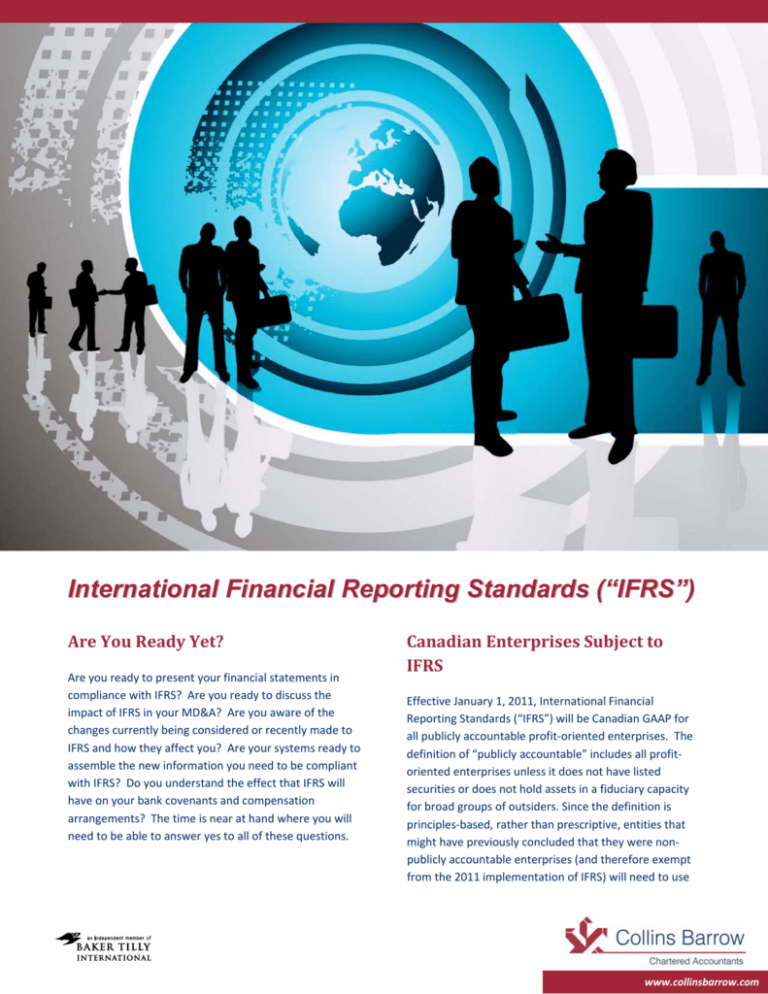
International Financial Reporting Standards (“IFRS”) Are You Ready Yet? Are you ready to present your financial statements in compliance with IFRS? Are you ready to discuss the impact of IFRS in your MD&A? Are you aware of the changes currently being considered or recently made to IFRS and how they affect you? Are your systems ready to assemble the new information you need to be compliant with IFRS? Do you understand the effect that IFRS will have on your bank covenants and compensation arrangements? The time is near at hand where you will need to be able to answer yes to all of these questions. Canadian Enterprises Subject to IFRS Effective January 1, 2011, International Financial Reporting Standards (“IFRS”) will be Canadian GAAP for all publicly accountable profit‐oriented enterprises. The definition of “publicly accountable” includes all profit‐ oriented enterprises unless it does not have listed securities or does not hold assets in a fiduciary capacity for broad groups of outsiders. Since the definition is principles‐based, rather than prescriptive, entities that might have previously concluded that they were non‐ publicly accountable enterprises (and therefore exempt from the 2011 implementation of IFRS) will need to use www.collinsbarrow.com International Financial Reporting Standards (“IFRS”) professional judgment and make a determination based on their specific facts and circumstances. Entities that are exempt may elect to adopt IFRS as their basis of accounting. The Office of the Superintendent of Financial Institutions (OSFI) has announced that all federally regulated financial institutions will be subject to the 2011 IFRS deadline. Road Map for Adoption – IFRS 1 IFRS 1 sets out the framework for first time adoption of IFRS at the date of transition. That date is the beginning of the earliest period for which an entity presents full comparative information under IFRS in its first IFRS financial statements. This date is not the same as the changeover date, which is the first year a company reports under IFRS. A first‐time adopter is required to prepare an opening IFRS balance sheet at the date of transition. As an example, using entities with a calendar year‐end, would prepare an opening balance sheet as of January 1, 2010 with January 1, 2011 being the changeover date. As at transition date of January 1, 2010, these entities would need to apply all of those IFRS standards which are effective for periods ending December 31, 2011 and apply them to the opening January 1, 2010 balance sheet. If a new IFRS standard is issued by the IASB with an effective date of January 1, 2011, it will need to be applied as at January 1, 2010. The measurement and disclosure requirements of first time adoption are quite extensive in the interim and annual financial statements as reconciliations are required for all interim and year‐to‐date figures issued after the changeover date. IFRS 1 requires that the first interim and annual financial statements prepared under IFRS include a reconciliation of previously reported Canadian GAAP equity at the transition date to the new IFRS balance sheets and a reconciliation of previously reported Canadian GAAP net earnings for the comparative period to IFRS net earnings for that same period. Reconciling items can be created as financial statement line items are re‐measured or re‐classified. Re‐measurement occurs in a number of situations, including where, the basis has changed (e.g. from cost to fair value), discounting is required/prohibited (e.g. provisions, impairments), and reversal of past impairment charges required. Reclassification can happen between line items for such items as accretion of asset retirement obligations and debt refinanced post balance sheet date. Canadian Securities Administrators (“CSA”) Staff Notice 52­320, Disclosure of Expected Changes in Accounting Policies Relating To Changeover to International Financial Reporting Standards CSA Staff Notice 52‐320 provides guidance to an issuer on disclosure of expected changes in accounting policies relating to an issuer’s changeover to International Financial Reporting Standards (IFRS) as the basis for preparing its financial statements. This guidance applies to disclosure relating to each financial reporting period in the three years before the first year for which an issuer prepares its financial statements in accordance with IFRS. CSA staff recognize that an issuer will likely be able to provide only limited information in its MD&A three and two years before the first day of an issuer’s financial year for which financial statements are prepared in accordance with IFRS (issuer’s changeover date). An issuer will generally be able to provide more detailed information about the expected effects of IFRS on its specific circumstances in its MD&A for interim and annual periods of the year before the issuer’s changeover date. As an issuer moves closer to its changeover date, the issuer should consider how it might present meaningful quantitative information to allow investors to understand the impact of IFRS on the issuer’s financial statements. Collins Barrow Contact your trusted Collins Barrow advisor to discuss how they can be of assistance to you and your company. The need to be able to discuss and present the changes that will be necessary under IFRS is fast approaching. Page | 2 www.collinsbarrow.com

